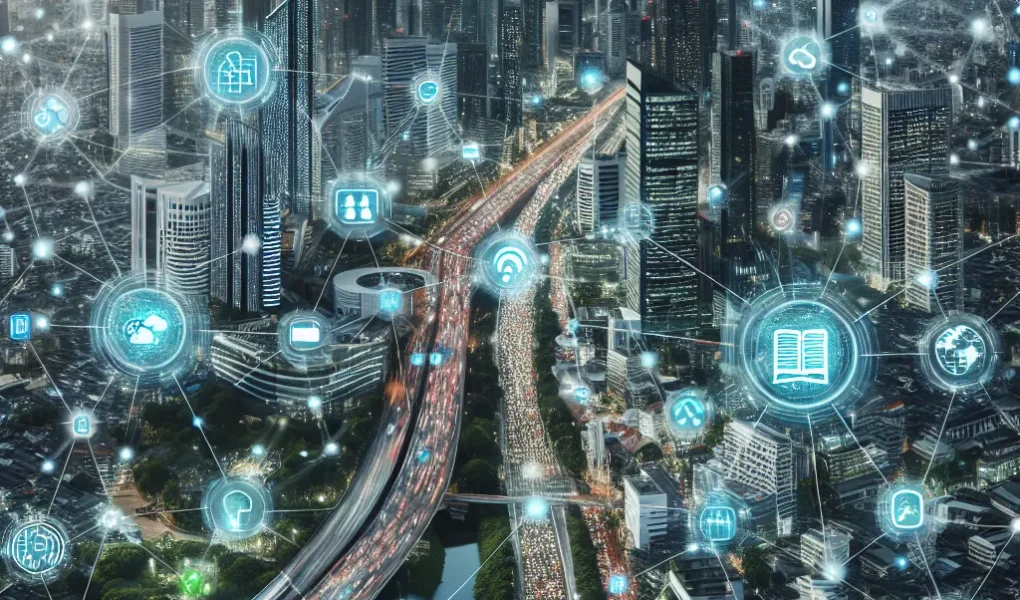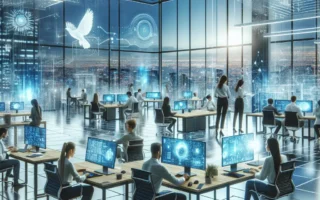Artificial Intelligence Revolutionizing Business Operations
Artificial Intelligence (AI) is revolutionizing business operations across industries, presenting new opportunities for efficiency, productivity, and innovation. One of the latest technological trends shaping industries, AI is being leveraged to automate repetitive tasks, analyze complex datasets, and make data-driven decisions. In the healthcare sector, AI is streamlining patient care, from diagnosing diseases to personalizing treatment plans. In manufacturing, AI-powered robots are enhancing production lines and improving quality control. Retail businesses are using AI to provide personalized shopping experiences and optimize inventory management.
Moreover, AI is transforming the finance industry by detecting fraud, automating customer interactions, and forecasting market trends. In the field of customer service, chatbots and virtual assistants equipped with AI are enhancing customer support processes. The potential of AI in revolutionizing business operations is boundless, with predictive analytics and machine learning algorithms enabling proactive decision-making and risk management.
As AI continues to advance, companies across diverse sectors are embracing this technology to gain a competitive edge and achieve strategic objectives. However, while the benefits of AI are substantial, ethical considerations and data privacy concerns must also be carefully addressed to ensure responsible implementation and usage of AI in business operations.
Blockchain Technology Reshaping Financial Industry
Blockchain technology has emerged as a groundbreaking innovation that is reshaping the financial industry. With its decentralized and secure nature, blockchain has the potential to revolutionize traditional financial systems, making transactions more efficient, transparent, and secure.
One of the key trends in the financial industry driven by blockchain technology is the advent of cryptocurrencies. These digital currencies, such as Bitcoin and Ethereum, use blockchain to enable peer-to-peer transactions without the need for intermediaries like banks. This has the potential to transform the way people store, send, and receive money, ultimately challenging the traditional banking system.
Another significant impact of blockchain on the financial industry is the introduction of smart contracts. Smart contracts are self-executing contracts with the terms of the agreement directly written into code. These contracts run on the blockchain, ensuring that they are executed exactly as programmed without any possibility of downtime, censorship, fraud, or third-party interference. This innovation has the potential to streamline and automate a wide range of financial and legal processes, reducing the need for manual intervention and thus cutting costs.
Furthermore, blockchain technology is also influencing the way that assets are managed and traded. The use of blockchain in asset tokenization allows for the representation of ownership of real-world assets, such as real estate or artwork, as digital tokens on a blockchain. This opens up new possibilities for fractional ownership and liquidity, potentially democratizing access to investment opportunities that were previously out of reach for many individuals.
In conclusion, blockchain technology is reshaping the financial industry by introducing new ways of transacting, automating processes, and democratizing access to investment opportunities. As this technology continues to evolve and gain widespread acceptance, its impact on the financial industry is expected to be transformative.
Internet of Things (IoT) Redefining Consumer Experience
One of the most significant technological trends shaping industries today is the rise of the Internet of Things (IoT). IoT has been redefining consumer experience across various sectors, revolutionizing the way people interact with everyday objects and devices. This interconnected network of physical devices, vehicles, appliances, and other items embedded with sensors, software, and network connectivity enables these objects to collect and exchange data.
In the retail industry, IoT is transforming the consumer experience by creating smart, connected environments. For example, smart shelves equipped with IoT sensors can monitor product levels and automatically reorder inventory, ensuring that items are always in stock. Additionally, IoT technology enables retailers to personalize the shopping experience through targeted product recommendations based on individual customer preferences and past purchasing history.
Meanwhile, in the healthcare sector, IoT devices are enhancing the patient experience by enabling remote monitoring and telemedicine. Wearable health trackers and IoT-enabled medical devices allow individuals to track their vital signs and activities in real time, providing healthcare professionals with valuable data for proactive and personalized care.
Moreover, the automotive industry has seen a major shift in consumer experience due to IoT integration. Connected cars equipped with IoT technology offer advanced safety features, real-time traffic information, and enhanced infotainment systems, providing a seamless and personalized driving experience for consumers.
Overall, the Internet of Things is playing a pivotal role in redefining consumer experience across industries, empowering businesses to deliver personalized and innovative products and services that cater to the evolving needs and preferences of the modern consumer.
Advancements in Virtual Reality Transforming Entertainment Sector
Virtual reality (VR) technology has been making significant strides in recent years, revolutionizing various industries, including the entertainment sector. The advancements in VR have transformed the way people experience entertainment, offering immersive and interactive experiences like never before.
With the development of more powerful and affordable VR headsets, consumers can now enjoy a wide range of entertainment options, from immersive gaming experiences to virtual concerts and events. This technology has also opened up new possibilities for the film industry, allowing directors to create virtual movie sets and offer viewers a truly immersive cinematic experience.
Furthermore, VR has also made its mark in the theme park industry, with VR-enhanced rides and attractions providing visitors with thrilling and realistic experiences. This technology has not only elevated the entertainment value but has also extended the lifespan of existing attractions by offering new, exciting experiences to visitors.
Moreover, VR has enabled the development of virtual environments for live events and performances, allowing people to attend concerts, sports events, and other live shows from the comfort of their homes. This has proven to be especially valuable in a time when live events have been impacted by global events, providing an alternative way for people to connect and enjoy entertainment.
As VR technology continues to advance, it is expected to further transform the entertainment sector, blurring the lines between the physical and digital worlds and offering new and innovative experiences for consumers.
The Impact of 5G on Communication and Connectivity
The latest technological trends are revolutionizing industries across the globe, and one of the most impactful developments is the advent of 5G technology. The impact of 5G on communication and connectivity is significant, reshaping the way businesses operate and people interact. With its ultra-fast speeds and low latency, 5G is unlocking a new era of possibilities for various sectors.
In the realm of communication, 5G is facilitating seamless and real-time interactions. Video calls, conferences, and data sharing are becoming more efficient and immersive, enabling remote collaboration like never before. This has profound implications for businesses, as they can streamline operations and reach global markets with ease. Moreover, 5G’s reliability and capacity are paving the way for innovations in the Internet of Things (IoT), leading to smarter and interconnected devices that can communicate instantly.
Furthermore, the impact of 5G on connectivity extends beyond traditional communication channels. Industries such as healthcare, transportation, and manufacturing are leveraging 5G to enhance their processes. In healthcare, remote patient monitoring and telesurgery are made viable with the robust and low-latency connectivity offered by 5G. The transportation sector benefits from enhanced safety measures and the potential for autonomous vehicles, while manufacturing industries are integrating 5G to enable real-time monitoring and control of operations.
As 5G continues to proliferate, the landscape of communication and connectivity will undergo a profound transformation. The speed, reliability, and low latency of 5G will empower industries to innovate and create new paradigms for interaction and operation.
Automation and Robotics in Manufacturing: A Game Changer
Automation and robotics are revolutionizing the manufacturing industry at an unprecedented pace, reshaping processes, and redefining efficiency. These technological advancements have become a game changer, propelling industries into a new era of productivity and innovation.
With the integration of automation and robotics, manufacturing processes have witnessed a significant transformation, streamlining production, enhancing precision, and minimizing human intervention. One of the key trends in this realm is the deployment of collaborative robots, or cobots, which work alongside human operators, ensuring a harmonious coexistence of man and machine on the factory floor.
Furthermore, the advent of smart manufacturing systems has ushered in an era of interconnected machines and intelligent data analytics. This interconnectedness has paved the way for predictive maintenance, minimizing downtime, and optimizing production schedules. The implementation of Industrial Internet of Things (IIoT) has allowed manufacturers to gather real-time data, empowering them to make informed decisions and enhance overall operational efficiency.
Moreover, the rise of 3D printing technology has disrupted traditional manufacturing methods, enabling the creation of complex structures with unprecedented speed and accuracy. This has led to the customization of products, reduced lead times, and minimized material wastage, thereby revolutionizing the manufacturing landscape.
In conclusion, the integration of automation and robotics in manufacturing has not only optimized operational processes but has also catalyzed a paradigm shift in the industry. Leveraging these technological advancements is imperative for companies to stay competitive in a rapidly evolving global market.
Keywords: automation, robotics, manufacturing, smart manufacturing, 3D printing, collaborative robots, cobots, Industrial Internet of Things, predictive maintenance
Sustainable Technology Innovations for Environmental Conservation
In recent years, sustainable technology innovations have been at the forefront of environmental conservation efforts across various industries. From renewable energy sources to eco-friendly manufacturing processes, businesses are increasingly embracing sustainable technologies to reduce their environmental impact. One of the latest trends in sustainable technology is the development of advanced energy storage systems, such as grid-scale batteries and hydrogen fuel cells, which play a crucial role in integrating renewable energy into existing infrastructures.
Furthermore, sustainable agriculture technologies, including precision farming and vertical farming, are revolutionizing the way food is produced while minimizing water usage and eliminating harmful chemicals. In the transportation sector, electric vehicles and alternative fuels are gaining momentum, offering cleaner and more sustainable mobility options. These innovations not only reduce carbon emissions but also drive the transition towards a more environmentally friendly transportation system.
Another notable trend is the rise of circular economy technologies, enabling businesses to minimize waste generation and maximize resource efficiency. Through concepts such as product-as-a-service models and closed-loop manufacturing, companies can reduce their environmental footprint while promoting the reuse and recycling of materials.
Overall, sustainable technology innovations are reshaping industries by integrating environmental considerations into business strategies and operations. As the global focus on sustainability continues to grow, these technological advancements are set to play a pivotal role in driving long-term environmental conservation and establishing a more sustainable future for the planet.



